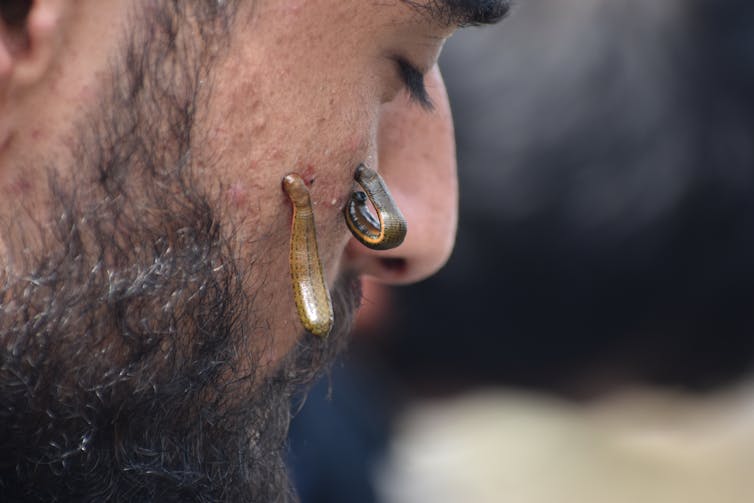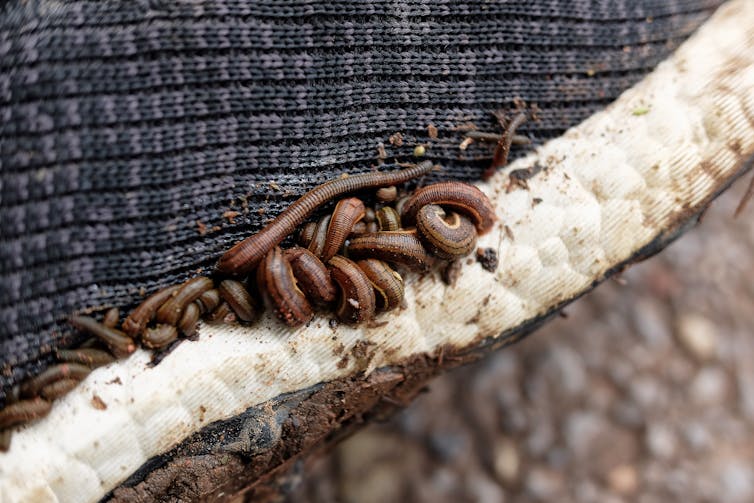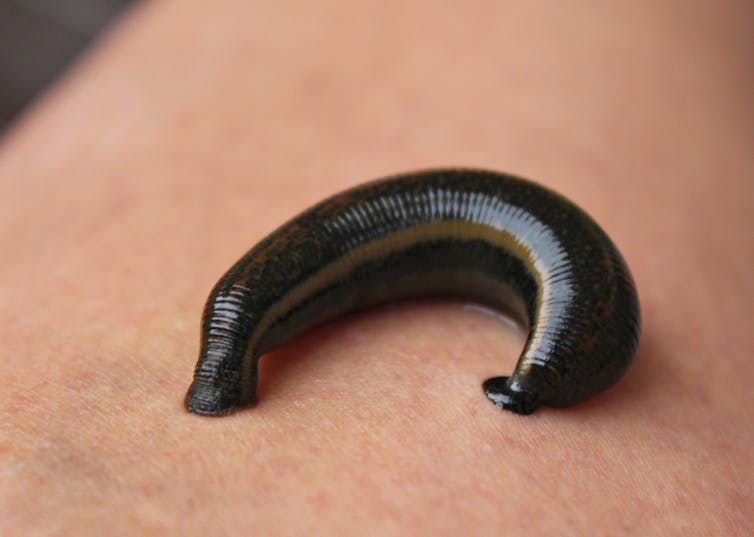why do leeches suck our blood?
- Written by Mark Sandeman, Honorary Professor, Federation University Australia
Curious Kids is a series for children. If you have a question you’d like an expert to answer, send it to curiouskids@theconversation.edu.au You might also like the podcast Imagine This, a co-production between ABC KIDS listen and The Conversation, based on Curious Kids.
Why do leeches suck our blood? - Thomas, aged 6.
The short answer is that leeches need blood to grow and reproduce (make baby leeches).
Leeches are worms that live in water or on land and feed by sucking blood from fish, frogs, lizards, birds or, if they get the chance, larger animals like humans.
They suck blood because it is a very good food for them. Some leeches only need to feed once a year.
The only trouble with sucking blood is you have to do it very carefully, especially if the animal you are sucking it from is able to bite you or pull you off. So leeches, like all blood suckers, usually like to bite without causing too much pain. They like to bite in spots where they are hard to find.
Blood clots but leeches have a solution
The other thing leeches have to worry about is that blood clots. A blood clot forms whenever you get a cut which stops bleeding in a few minutes – eventually the blood clot forms a scab.
This happens when blood contacts the air. It clumps together and forms a solid lump. The leech cannot feed if the blood forms a lump and so it releases a chemical that prevent this clumping.
This keeps the blood flowing so the leech can suck for two or three hours without stopping. That way it collects enough food to last until it finds another animal to bite.
 Leeches were once used in medicine.
Faizan Ahmad sheikh/shutterstock
Leeches were once used in medicine.
Faizan Ahmad sheikh/shutterstock
Read more: Curious Kids: how does our heart beat?
Leeches are not the only animal that feeds on the blood of animals. Others include mosquitoes, ticks, vampire bats (yes they exist, but only in South America), bed bugs, lice, other insects and the lamprey fish. All these feed on larger animals – but don’t kill them, so they are all called parasites.
Parasites all live on or in other animals and many of them feed on blood. Blood is easy to collect whether you are inside or outside the body. It is highly nutritious and there is always lots of it, so the animal the parasite is feeding on can usually spare some.
 Here are some leeches on the shoe of a hiker in the rainforest.
Shutterstock
Here are some leeches on the shoe of a hiker in the rainforest.
Shutterstock
Leeches and medicine
Leeches can be annoying and their bites can make us itchy but they are not usually dangerous to humans. In fact, leeches have been used to treat human diseases for thousands of years. Their blood sucking ability was thought to be useful in sucking diseased or “bad” blood out of the body and so sick people had leeches applied regularly.
However, we now know that allowing leeches to suck blood does little to help in most cases. In fact, if too many leeches are applied, a sick person can get weak from loss of blood.
The one area of medicine where leeches are still helpful is using them to improve blood circulation in the skin. They also reduce the chances of blood clotting when that could be dangerous in some sick people. However, these days we can make an artificial version of the chemical leeches use to prevent blood clots, which is called “hirudin”.
 Leeches need blood to grow and reproduce.
Pixabay
Leeches need blood to grow and reproduce.
Pixabay
Leeches need blood to grow and reproduce, which they can do easily as all leeches are both male and female at the same time. They still have to mate with another leech but both partners can lay eggs after mating.
Read more: Curious Kids: do ants have blood?
Hello, curious kids! Have you got a question you’d like an expert to answer? Ask an adult to send your question to curiouskids@theconversation.edu.au
 CC BY-ND
Please tell us your name, age and which city you live in. We won’t be able to answer every question but we will do our best.
CC BY-ND
Please tell us your name, age and which city you live in. We won’t be able to answer every question but we will do our best.
Authors: Mark Sandeman, Honorary Professor, Federation University Australia
Read more http://theconversation.com/curious-kids-why-do-leeches-suck-our-blood-117316



















